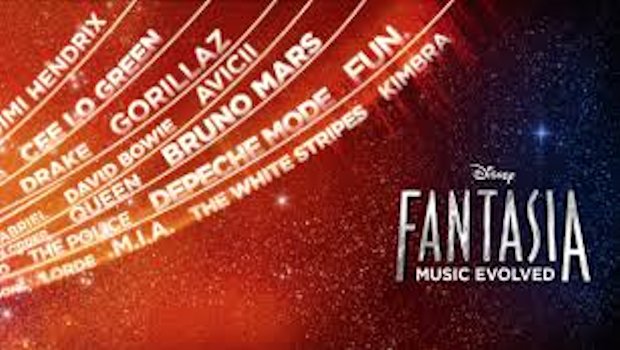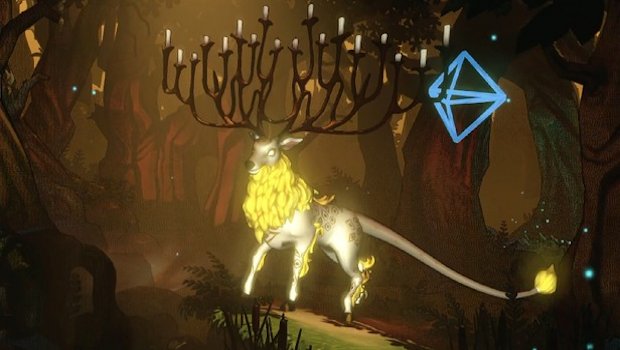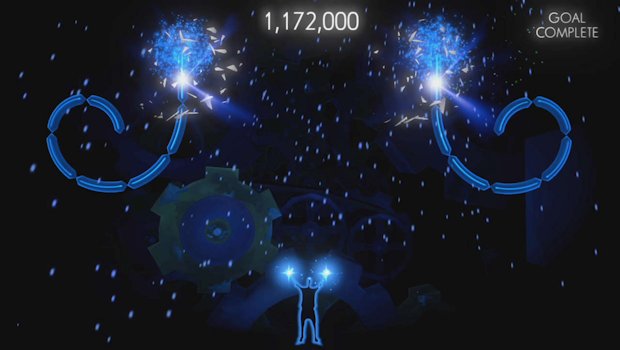Walt Disney’s 1940 classic film, Fantasia, is one of my all-time favorites. The film’s narrative, told through carefully-choreographed animation to select pieces of music, is an artistic masterpiece and one of the most fascinating pieces of cinema ever released. 60 years after Fantasia, Disney released a sequel, Fantasia 2000, and while pleasant enough, it was decidedly less groundbreaking and ultimately less engaging because of it. The animation in Fantasia 2000 was still spectacular and the music still beautiful but it is telling that the best segment of that film was a piece from the original film. Fantasia 2000 faltered because it failed to bring anything new to the table, relying on the original’s format to sell itself. In short, the concept failed to evolve.
Fantasia: Music Evolved, the latest release from developer Harmonix, looks to take the name Fantasia and, like its subheading implies, evolve its concept. And evolve that concept it does, dramatically so, to stellar results..
Like Dance Central before it, Fantasia: Music Evolved is a rhythm-based motion game designed specifically for the Kinect. Disney chose well with its choice of developer for this game because Harmonix is the premier music game developer out there. And, more than anyone else, they have mastered the Kinect, understanding the camera’s strengths and weakness in ways Microsoft wishes their own internal developers could.
Unlike Dance Central, Fantasia won’t have you dancing around your living room, trying to contort your body into unnatural dance poses that make you look like a complete buffoon. You’ll still look like a buffoon but more because you are magically conducting the music on the screen using a series of simple motions, like swipes and punches. Indicators timed to the music will flash on screen showing you what to do and when to do it. Doing moves correctly will increase your score, while doing them incorrectly lowers the volume of the music to inaudible levels.
Mechanically, this is all there is to the game and it is this simplicity that is the game’s greatest strength. Anything more complicated would cause absolute havoc when trying to play some of the harder entries on the song list. And havoc would result in frustration, which is exactly the opposite of what Harmonix is seeking to accomplish with the game. Because if the original film and its sequel were about aligning storytelling and music together, Fantasia: Music Evolved is about aligning player interaction with the music. And everything in the game’s design points to uniting the players with the music selections.
The beautiful animation in Fantasia is something that has always stood out about the film and it comes as a bit of a shock that animation is not a primary focus with Music Evolved. But this makes sense as games are an interactive medium. Sure, Fantasia: Music Evolved has some great artwork, but these are just hub pieces that have slight interaction points with them. The hubs could cease to exist completely if it were not for the fact that the game’s campaign requires some visual representation and narrative. Playing the campaign, which took me about four to five hours before the credits rolled, is mostly just an elaborate tutorial pushing you towards the game’s true purpose: personal music creation.
Every song in Fantasia: Music Evolved has a set of three mixes available to them. While songs can be played using any one of the remixes, the game encourages you to utilize all the remixes and make your own. This is done through multipliers. As you play the game you’ll be given chances to increase the current active score multiplier, up to 12x, and in doing so, pick certain aspects of a remix. So you could be playing Tchaikovsky’s “The Nutcracker Suite, Op 71a” and adding in elements of trance and dub-step to create a wholly unique mix of your own. It is a fascinating system that allows player agency in how the music is being delivered on screen and ultimately played in the game.
But music creation doesn’t stop with the various mixes. Utilizing what the game calls Composition Spells, players can create and add their own beats and samples to the game when playing with a certain active mix. These mixes are all created by unlocking the spell, via specific indicated motions, and then manipulating the composition spell by playing along with the onscreen activity. I was a bit worried at first because manipulating sounds and layering it over professionally composed music could spell disaster. Yet, each and every time I created a beat or sample to add to a song, they somehow fit together perfectly. This adds even more of a sense of ownership towards each song performance and ends up connecting the players even more to the music they are playing.
Fantasia: Music Evolved shines as its gameplay is simple and fun, allowing the creative spark of the players to take center stage. And the gameplay is the most important aspect of the game. Unfortunately, getting to the gameplay can, at times, be a bit of a struggle. While the motion controls work nearly flawlessly in terms of conducting and creating the music on screen, navigating around the menus of Fantasia: Music Evolved leaves a bit to be desired. When playing the campaign I found selecting things to be something of a chore. Sometimes it would select what I wanted; other times, it would grab something just off to the side. And then actually opening what I selected was a bit hit or miss as it required a pair of different motions that didn’t always register. There is a controller option for singular song selection but it doesn’t operate in the campaign. This ended up with me feeling a bit fed up with the game at points. This is something that has plagued other Kinect games, including Harmonix’s own Dance Central titles, and it’s more than a little frustrating that it is still happening four years and a hardware revision later.
Menu issues aside, Fantasia: Music Evolved is the showcase piece for the Kinect. It is a true shame that this game was not available when the system launched to showcase the device’s capabilities. Harmonix has done a stellar job for Microsoft in this regard. But more importantly they have done a stellar job for Disney in evolving Fantasia into an interactive musical experience and bringing the spirit of Fantasia to a new generation. I’d like to think Walt Disney would be proud.


